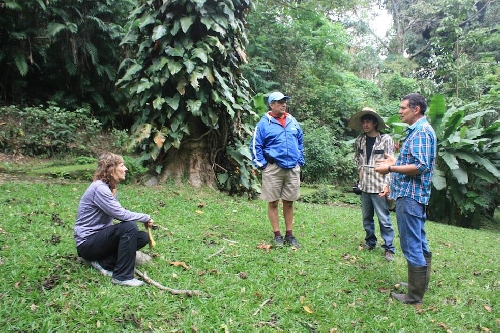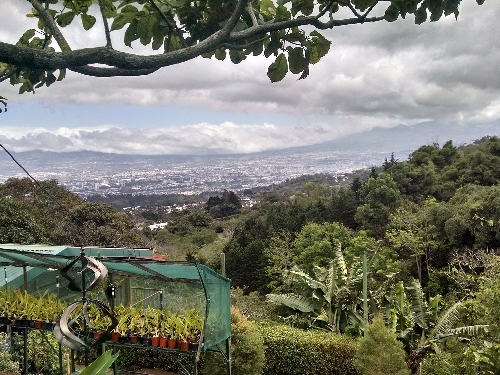Enhanced International Partnership Adding to Student Experiences
April 11, 2017

Pheiffer and her hosts shared ideas about how to cultivate a life more connected to the land.
[Download Print-Quality Image]
Video by Phil Weiss, University Television
MACOMB, IL – An existing international partnership between Western Illinois University and Veritas Universidad in Costa Rica has grown with a new project involving WIU's Horn Field Campus (HFC) and is benefitting the faculty of both campuses academically and professionally.
In 2012, Western signed an agreement with Veritas to allow WIU students to study abroad in Costa Rica or through the WISE Costa Rica program, led by faculty in WIU's foreign languages department.
In August 2016, a group of visitors from Veritas came to Macomb to meet with staff in international programs to discuss the development of an articulation agreement between the two universities in sustainability management. As part of their visit to the WIU campus, the Veritas representatives visited Horn Field Campus.
The group met with Horn Field Campus Director Mindy Pheiffer, who then traveled to Costa Rica during the recent holiday break to discuss the development of a study facility similar to HFC at Veritas in Costa Rica.
"They are interested in what we do at Horn Field Campus so they can then implement something similar at a field campus that they are beginning to develop in Costa Rica," said Pheiffer.
Pheiffer found herself talking with representatives of various academic segments of Veritas about the programming HFC offers.
"There are a lot of things that definitely translate," she said. "When we talked about the teams course at Horn Field Campus, they were not familiar with that concept, but we discovered our shared values through these concepts. We build our social capital at Horn, and at Western, by bringing people into 'the family' – teaching them about group dynamics and how we can work better together with communication, trust and leadership. Many people help us maintain things on campus and at Horn Field Campus. We have done a great job of building our social capital here."
While in Costa Rica, Pheiffer visited the existing site where Veritas officials are interested in creating a facility like Horn Field Campus. The Bio Center is located 80 miles from the main Veritas campus and is of similar size to Horn Field Campus. There is already a house on the site, similar to Horn Field's lodge, as well as primitive buildings for overnight stays and a well-maintained wooded area.
"It's mostly wooded area," Pheiffer said of the site. "An interesting thing for me was not realizing that they don't have a very long dormant season. Their tree growth in 30 years is as tall as ours is in 50-60 years. Bamboo trees grow 40 feet tall in eight years, so their species and their growing life are definitely different than ours."
Once the Veritas Bio Center is completed, Pheiffer said the partnership between the two schools can grow even stronger.
Alejandra Barahona, director of Veritas' Center for International Programs and Sustainability Studies said Pheiffer's visit was an "eye-opener" to all of the possibilities that can be developed at the Costa Rican Bio Center.
"She also gave us great feedback as to how to promote collaboration between our institutions," said Barahona.
She said Veritas' new bachelor's degree in sustainability management will not only be the first of its kind in Costa Rica, but also an innovative career booster for international students who enroll.
"It seeks to educate a new generation of managers for sustainable development projects through collaborative learning, transdisciplinary approaches and problem-oriented training," said Barahona. "The degree aims to move beyond merely theoretical approaches to sustainability and address some of the most significant environmental, economic and social changes of the 21st century. The curriculum framework is based on the 17 sustainable development goals (ODS) as guides for the training and research of tools that will prepare students to find solutions to the challenges related to sustainability."
Barahona said Veritas' Bio Center will have a variety of uses, including academic activities, business meetings, high school camps, international faculty-led programs and art and spiritual retreats. She said research developed at the site will include a Bioclimatic building, an open butterfly research garden, exercises in permaculture and agro-ecology, a bird watching tower, an amphibian pond, an apiculture project, a fiber garden for textile fiber research and analogous forestry. Barahona was inspired after seeing the development at Horn Field Campus.
"We hope to emulate many of (Horn Field's) initiatives at our biocenter in Guanacaste and structure collaborative faculty projects together," she said. "Mindy visited our biocenter and immediately showed us ways in which we can further develop our biological and sustainability research projects into a center for recreational activities and business team building courses."
The partnership between the two schools will provide opportunities for faculty and students to learn about sustainability management, exchange of students and benefit both campuses academically and professionally.
For more information about WIU's Horn Field Campus, visit wiu.edu/hfc.
Posted By: Jodi Pospeschil (JK-Pospeschil@wiu.edu)
Office of University Communications & Marketing


Connect with us: